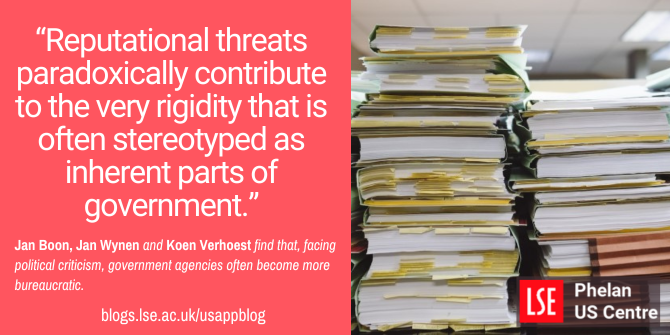

 Governments and government agencies are frequently the subject of criticism from the public, media, and politicians, over issues of inefficiency and bureaucracy. In new research, Jan Boon, Jan Wynen and Koen Verhoest find that exposure to these criticisms and the reputational damage that they can do can lead to government agencies having more rigid bureaucracies. They find that government organizations which experienced bursts of negativity, especially from legislators in Congress, were more likely to centralize decision-making, formalize procedures, disempower employees, and restrict information flows.
Governments and government agencies are frequently the subject of criticism from the public, media, and politicians, over issues of inefficiency and bureaucracy. In new research, Jan Boon, Jan Wynen and Koen Verhoest find that exposure to these criticisms and the reputational damage that they can do can lead to government agencies having more rigid bureaucracies. They find that government organizations which experienced bursts of negativity, especially from legislators in Congress, were more likely to centralize decision-making, formalize procedures, disempower employees, and restrict information flows.
Ask around what people think of the government, and their answers will likely be somewhere between disinterest and outright hostility. Back in the 1980s, President Reagan famously said that government was not the solution to our problems, but rather the problem itself. This sentiment continues to be echoed by media, politicians, and reform proponents who frequently assert that government organizations are inefficient and burdened by administrative procedures. The very word ‘bureaucracy’ has become a derogatory term, associated with the very worst our governments have to offer.
Bureaucratic rigidity tends to be seen as the cause of widespread discontent. In new research, we find that the reverse may be equally true. Government organizations faced with reputational threats are likely to become more rigid and display the very characteristics that critics voiced about these agencies in the first place.
How government organizations respond to reputational threats
What do we mean when we talk about organizational rigidity and reputational threats? First, we looked at organizational rigidity as a process rather than as an outcome. We focused on several characteristics that are generally associated with rigid organizations: centralized decision-making, a lack of innovation and creativity, and a lack of employee empowerment and flexibility. Second, reputational threats reflected the extent to which government organizations were negatively perceived by their external stakeholders. More specifically, we looked at how legislators in Congress perceived different agencies (more neutral, more positive, or more negative) and how these perceptions (which accumulate to an overall reputation) evolved over time. To measure whether reputations were under threat, we considered whether reputations were evolving negatively, but also whether reputations were evolving more turbulently (that is: quick successions of negative and non-negative perceptions).
Why would we expect reputational threats to lead to organizational rigidity? And why does the turbulence of reputations matter?
Our thinking was informed by threat-rigidity theory, which explains how organizations become more rigid in response to external threats. Let us first turn to the notion of threat. Threats refer to negative situations that are likely to lead to some form of loss, and over which one has relatively little control. Threats bring uncertainty, stress, and anxiety. To offset these negative emotions and perceptions, threat-rigidity theory expects that organizations will try to regain control by centralizing decision-making, formalizing procedures, disempowering employees, and restricting flows of information. Put differently: these organizations will become more rigid.
The current climate of distrust and hostility in which many government organizations are working reflects this state of perceived threat when one’s organization has effectively entered the spotlight of public scrutiny. Therefore, we expected that negative turns in political attention would be seen as a threat by the organizations. However, previous studies have shown that the legitimacy of certain types of agencies is unharmed by repeated criticism. Consider tax administrations for instance: few people like them, but we generally feel they should exist. This observation informed the inclusion of reputational turbulence in our study: while continuous negativity over time would have enabled agencies to somehow deal with this situation, successive bursts of negativity would produce the rigidifying tendencies that threat-rigidity theory predicts.
Reputational threats can lead to greater organizational rigidity
To test whether reputational threats indeed lead to more organizational rigidity, we brought together existing data sources that longitudinally tracked the reputations and characteristics of rigidity for 34 government organizations over 13 years (1998-2010). We focused on organizations from the federal government level in the United States, such as the Department of Justice, the Environmental Protection Agency, or the Federal Trade Commission.
Our results confirmed our theoretical expectations: different indicators of reputational threats – we looked both at ‘how negative’ and ‘how turbulent’ reputations evolved – consistently initiated higher levels of organizational rigidity.
Why does this matter?

Photo by Wesley Tingey on Unsplash
First, criticisms of government organizations are not innocent and may have unintended effects. To be clear: we are not in any way claiming that politicians should stop controlling our governments and, if needed, call out malpractices. On the contrary, thorough and honest account-holding practices are inherent parts of our representative democratic systems. That said, we also need to be aware of the internal organizational dynamics that may be set in motion by these accountability dynamics. While one would hope that government organizations take external criticism as incentives to become more innovative and enact meaningful change, our results point at a less optimistic yet more psychologically realistic mechanism: that reputational threats paradoxically contribute to the very rigidity that is often stereotyped as inherent parts of government.
Second, our results particularly challenge the increasing prominence of so called “show-horse” oversight; or: political oversight that is mainly performed considering politicians’ own reputation or electoral motives. While such oversight often misses, or even distorts, accurate reflections of an agency’s performance, the potentially resulting rigidifying dynamics are very real.
Third, our results should serve as a warning signal for decision-makers within organizations under threat. Their internal centralizing and formalizing measures in response to external threats are both understandable and common. Yet their natural and inherently human response to regain control through these measures does come at the cost of a flexible, innovative, and empowered workplace. We therefore urge managers in such conditions to be more reflexive of the type of response – and organization – they create in response to reputational threats.
- This article is based on the paper, ‘Do reputational threats influence the rigidity of US agencies? A dynamic panel data approach’, in Public Administration Review.
- Please read our comments policy before commenting.
- Note: This article gives the views of the author, and not the position of USAPP – American Politics and Policy, nor the London School of Economics.
- Shortened URL for this post: https://bit.ly/3uM0nq1






